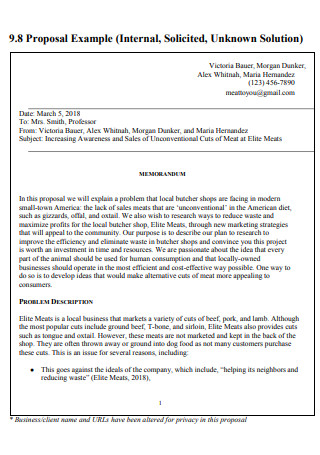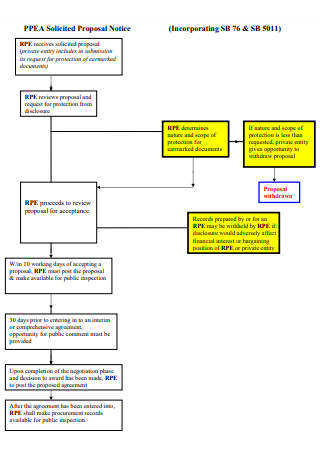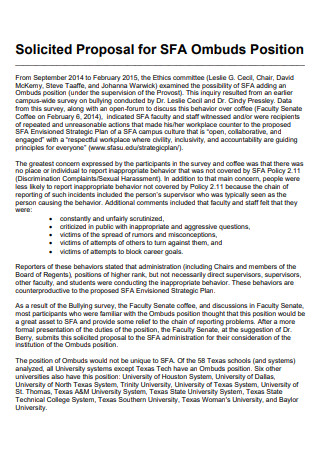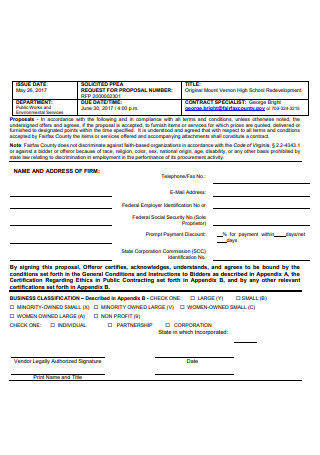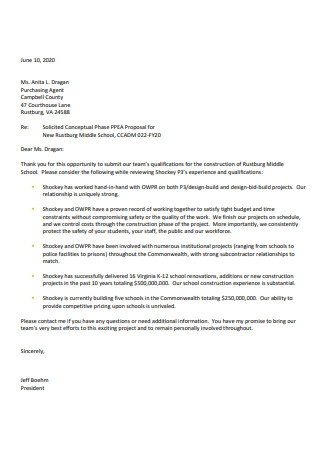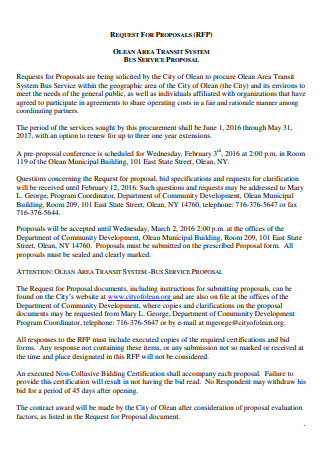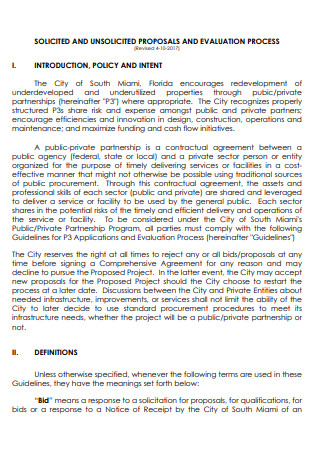6+ Sample Solicited Proposal
FREE Solicited Proposal s to Download
6+ Sample Solicited Proposal
What Is a Solicited Proposal?
What Is the Difference Between Solicited and Unsolicited Proposals?
What Are the Key Elements that Proposals Contain?
What Are Some Tips to Make Successful Solicited Proposals?
Types of Solicited Proposals
How to Make Solicited Proposals
FAQs
How Do You Write an Academic Proposal?
What Does a Good Proposal Look Like?
What Makes a Good Grant Proposal?
A business proposal, on the other hand, is sent to a prospective client by a freelancer or corporation in an attempt to secure a certain contract or project for them. They differ from “estimates” in another respect. Estimates are employed while delivering minor services to a large number of people. In this instance, the lengthy requirements become burdensome to complete. Estimates are also included in cases where the company in question already has a positive reputation with its customers. For example, house cleaning tasks and roofing sales are both in high demand. There are two types of business proposals: those that have been solicited and those that have not been solicited. This article examines in detail what distinguishes them from one another.
What Is a Solicited Proposal?
Solicited business proposals are written when consumers request suggestions on their own initiative. The obligation may be communicated verbally or through the use of mass media outlets. A description of what the customer or buyer is looking for is included in the solicited proposal. It can also include formatting instructions as well as the criteria that will be used to make a decision on which candidate to hire. Furthermore, Solicited was technically referred to as A business proposal that has been formally sought is one that is submitted in response to an official request for proposals. In this scenario, you are aware of all of the requirements and have a great deal of information (if not all) about a possible buyer. All you have to do now is develop a proposal that your buyer can assess.
Other templates are available on our website, and you can use them whenever you need them. They are as follows: unsolicited proposal template, unsolicited business proposal, external proposal, research proposal, sales proposal cover, job proposal, grant proposal, informal business proposal, formal business proposal, free project proposal, and other similar templates are available. This post will not only provide you with templates but will also provide you with important information that you need to know in order to complete your template.
What Is the Difference Between Solicited and Unsolicited Proposals?
In a nutshell, solicited business proposals are those that are created in response to a customer’s request, and unsolicited business proposals are those that are created to reach out to potential clients. Solicited business proposals are written when consumers request suggestions on their own initiative. The obligation may be communicated verbally or through the use of mass media outlets. A description of what the customer or buyer is looking for is included in the solicited proposal. It can also include formatting instructions as well as the criteria that will be used to make a decision on which candidate to hire. Unsolicited business proposals are those that are sent to clients who have not specifically requested them to do so. They are submitted on the initiative of the person who is proposing them. Getting the attention of prospective buyers and clients is their primary objective. They are generic in nature and are not directly related to the needs of a specific customer. You must first convince the customer that there is a problem before you can write an unsolicited business proposal for him or her. Because the consumer is not expecting the proposal, it must be extremely persuasive. They are typically used to publicize new products and services, among other things. It is possible to improve your chances of securing the contract by initiating contact with the agency people with whom you wish to do business.
What Are the Key Elements that Proposals Contain?
The five fundamental aspects of persuasion are the source, the message, the channel, the audience, and the effect. Let’s take a quick look at each of the elements. The quality of the source–the individual or organization that is conveying the message–is extremely essential in determining the effectiveness of the message. The source must be regarded as credible.
What Are Some Tips to Make Successful Solicited Proposals?
Concentrate on three main areas: the problem statement, the proposed solution, and the pricing details. In the problem statement, express your customer’s requirements as simply and clearly as possible. In order for the client to feel that you can assist them, they must be certain that you understand the problem they are experiencing. The primary goal is to come up with a solution to the problem. It should contain as much detail as feasible. When explaining how efficient it is, it should also address a variety of client issues, such as the environment’s safety. The pricing information is dependent on the type of solution that your company has offered. It is equally critical to demonstrate to the client why they should choose you. Emphasize the knowledge and experience of your company, as well as the abilities and qualities of your employees.
Types of Solicited Proposals
The customer has shown a desire to purchase something. As a response to this need, a suggestion is being given. There are three types of business ideas that are solicited. They are as follows:
How to Make Solicited Proposals
When putting together a business proposal, you must design a strategy that is worthy of your client’s time and attention. It should explain how your product or service may be able to resolve your client’s most difficult problems by providing a straightforward answer that only you could provide. In order to accomplish so, you must first comprehend the challenges or troubles that your clients are now experiencing, as well as the reasons why they should consider doing business with you in the first place. Concentrating on the finer aspects of a business document can have a significant impact on how your message is received by those who will be reading it. As a result, when developing a corporate proposal, the following three considerations must be taken into consideration:
1. Your Client’s Requirements
Many proposal writers are so preoccupied with their own company that they fail to have a comprehensive understanding of their client’s needs. This includes the nature of their work, the industry in which they operate, and the obstacles that they encounter on a daily basis. Taking this into consideration, consider the following questions when you draft the first section of your proposal: What are the difficulties that this industry is facing? What is the current difficulty that the organization or firm is dealing with? As soon as you’ve figured out your responses, you’ll be able to open up a whole new set of questions that will be valuable as you begin to write your proposal. You can also solicit responses from the client in order to produce better outcomes. Check out our recommendation letter examples & samples for more ideas and inspiration.
2. Your Proposal for a Solution
In order to effectively communicate your recommended solution to a client’s challenges, you must demonstrate your awareness of their demands. This includes pertinent industry data and benchmarks that may be useful in assisting you with your investigation. Following that, you’d need to supply details about the procedure that needs to be followed in order to solve the problem. You might be interested in business letter examples and samples. Make certain that each stage in the process adds significant value; otherwise, you may be asked why each step is required in the first place. This part should also provide a description of the prospective outcomes and their implications for the client’s requirements.
3. The Federal Government
Then there will be the administrative components of your business plan that you will need to take care of. A preliminary timeline of project duties and responsibilities, the milestone to be achieved, the budget for your project plan, as well as the terms and conditions that must be satisfied are all included in this section. Also avoid using long, complicated paragraphs or jargon that may be difficult to understand. The majority of specialists highly advise that you keep your letter to one page and three or four paragraphs in length. You wouldn’t want to waste the reader’s valuable time by sending them an official letter when they already have a lengthy proposal to read and consider. If you want to ensure that your message is understood, short words and straightforward language are your best options.
A proposal is requested during the course of a sales process. It is recommended that you have proposal forms templates ready that can be simply customized for official consideration when a proposal is requested. This is due to the fact that the majority of clients who inquire about it are usually managers who must submit your offer to their boss for approval. Additionally, they may be on the selection committee, which means the information you present on the proposal formats templates is crucial in determining whether or not your organization will be selected for the position.
FAQs
How Do You Write an Academic Proposal?
Begin by explaining why your concept is worthwhile (what it will contribute to the area), and then explain how it will be implemented (technicalities about topic and method). Provide sufficient detail to prove viability, but not so much that the reader becomes bored. Demonstrate your capacity to deal with challenges or shifts in emphasis that may arise.
What Does a Good Proposal Look Like?
The cover of your proposal is the first thing that your sales lead will see, so it ought to leave a positive impression on him or her right away. It does not have to be spectacular; in fact, basic is often preferable; nonetheless, it must be well-designed. The proposal cover should include all of the necessary information, such as the following: The date on which the proposal was submitted.
What Makes a Good Grant Proposal?
A comprehensive grasp of the need in your community, as well as a solid programmatic answer, should be demonstrated in your proposal. Once your proposal has been read, the funder should have confidence that your organization will be an excellent manager and steward of its finances.
Business owners, managers, and independent contractors who are selling their services may find themselves in need of proposal formats templates at some point during the process. It is critical to distinguish between proposal samples and proposal templates. The samples may have already been prepared for a certain business or they may contain the specifics of a specific offer that is currently available. When compared to this, templates provide a predefined format that you can follow by simply inputting your company’s information. Templates for proposal formats can also be changed to meet your specific requirements. Adding sections, reorganizing the text, and providing any other information that is important to the prospect are all examples of what you can do. Most contractors, on the other hand, rely on pre-made templates, into which they simply insert their logo, company information, and details of the service they are providing.

